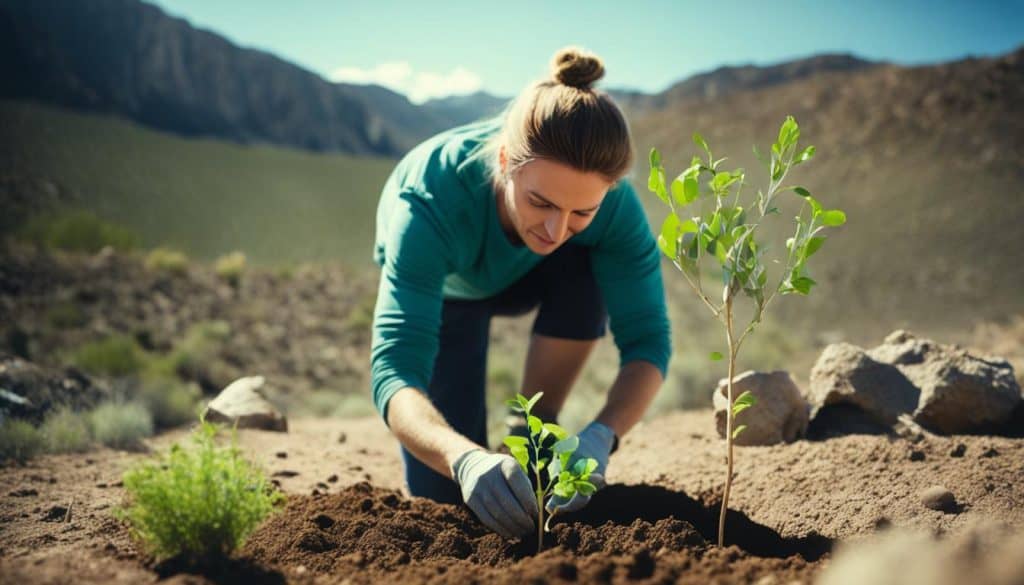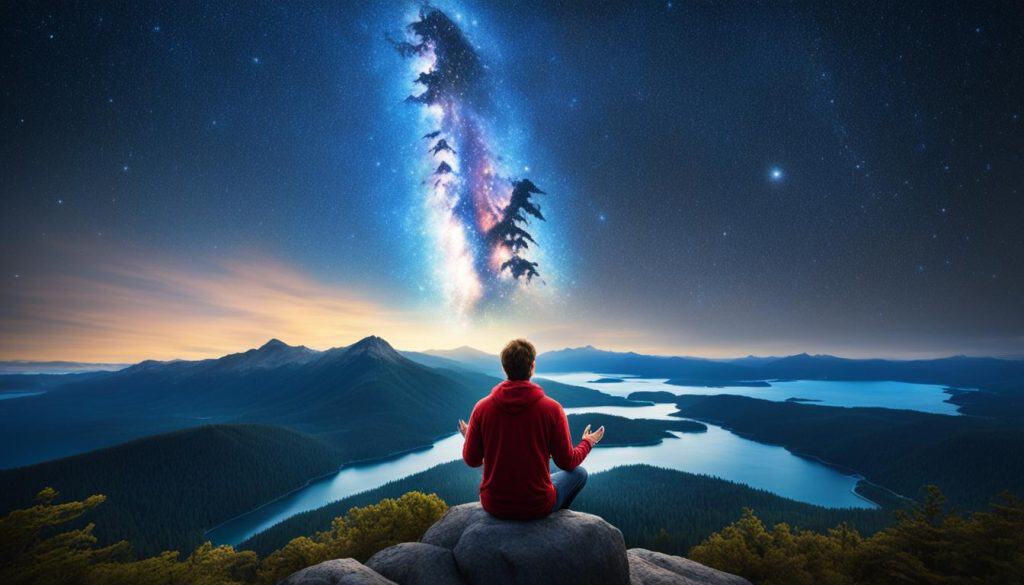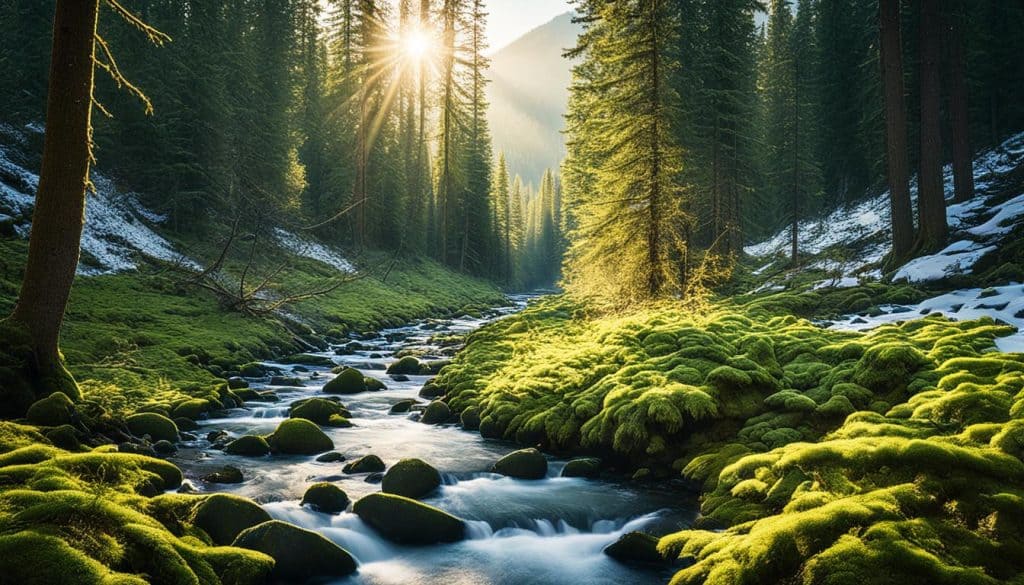We’re diving into a big question today. Does God really own the Earth and everything in it? This question makes us think about stewardship, generosity, and more. By understanding that God owns everything, our view of the world can change. It can change how we live and how we see the world.
Recognizing God’s ownership affects how we see the world. It affects our work as His stewards. In this article, we’ll talk about what this means for our daily choices. We’ll see how it changes how we see nature and feel about our needs being met. Also, it can make us have stronger faith and help us worship better.
So, we’re on this journey together. We’re exploring God’s ownership and its effect on our lives. Are you ready to think about God’s plan for the Earth? Let’s find the answers together.
How does recognizing God’s ownership of the earth influence your daily decisions?
Realizing God owns the Earth changes how we make choices each day. We think about what God wants and how our actions affect the planet.
Knowing God owns everything makes us more responsible. We see that every choice, no matter how small, impacts the Earth. Our food, the things we buy, everything is a chance to show respect for God’s Earth.
This understanding makes us more careful in our daily life. We look for ways to do what God likes. This changes how we act in our jobs, with our friends, and how we live our lives.
“The Earth is the Lord’s, and everything in it, the world, and all who live in it.” – Psalm 24:1
Our choices can really make a difference. We can use what we have to help others and take care of the Earth. Living this way shows that we respect God’s ownership of everything.
When we accept that God owns the Earth, we act with respect and care. We try to make God happy in everything we do. This encourages us to stand up for what is right and to show love to others.
Every day is a chance to show we know God owns everything. We aim to be good caretakers of the Earth God has given us.
| Before Recognizing God’s Ownership | After Recognizing God’s Ownership | |
|---|---|---|
| Finances | Focus on personal accumulation | Stewardship and generosity |
| Consumption | Self-centered choices | Consideration of environmental impact |
| Work | Pursuit of self-advancement | Seeking to honor God in all endeavors |
| Relationships | Selfish behaviors | Compassion and love towards others |
In what ways can you show respect for God’s creation?
Showing respect for God’s creation is a powerful practice. It comes from realizing we don’t own it. We can show we’re thankful for God’s work by treating the environment and wildlife with care. Here’s how you can respect God’s creation:
1. Practicing Environmental Stewardship
Being careful with our impact is key. Make sure to lessen waste and use things again. Save energy and water. Pick products that are kind to the earth. Also, support farming that’s good for the land.
2. Supporting Wildlife Conservation Efforts
Animals are key in the circle of life. Help by supporting groups that protect wildlife. Know about animals in danger and help save their homes.
3. Minimizing Pollution
Pollution is bad for everything God created. Lessen it by driving less and properly tossing your trash. Use chemicals that are safe for the earth. Small steps help a lot.
4. Promoting Sustainable Agriculture
Back farmers who farm the right way. Choose foods and items that are organic and local. This supports caring for the earth and the people on it.
5. Cultivating a Connection with Nature
Enjoy the outdoors to see God’s work up close. Go for walks in parks or forests. Look at the plants and animals. Let their beauty touch your heart.
In the words of John Muir, “In every walk with nature, one receives far more than he seeks.”
6. Teaching Others About Respect for God’s Creation
Tell others how to care for God’s world. Teach kids about caring for nature and animals. Passing on these values helps the world stay beautiful.
By doing these things, we show we know the earth belongs to God. Let’s care for everything God made. Together, we protect the world God gave us.
| Practical Ways to Show Respect for God’s Creation | Description |
|---|---|
| Practicing Environmental Stewardship | Reduce, reuse, recycle, conserve energy and water, support organic farming. |
| Supporting Wildlife Conservation Efforts | Learn about endangered species, participate in conservation initiatives. |
| Minimizing Pollution | Reduce vehicle emissions, dispose of waste properly, avoid harmful chemicals. |
| Promoting Sustainable Agriculture | Support farmers prioritizing sustainable practices, buy organic and locally sourced products. |
| Cultivating a Connection with Nature | Spending time in nature, appreciating its beauty and intricacies. |
| Teaching Others About Respect for God’s Creation | Educate children and young people about environmental stewardship. |

How can trusting in God’s ownership alleviate your worries about provision?
Provision worries can be consuming. Will our needs be met? Will there be enough? Trusting in God’s ownership offers a path to peace.
Trust is the crucial factor here. Realizing God is the owner can lead to a worry-free life. We can place our provision worries in His capable care.
“Look at the birds of the air; they do not sow or reap or store away in barns, and yet your heavenly Father feeds them. Are you not much more valuable than they?” – Matthew 6:26
This verse highlights God’s care for all. If He takes care of the birds, surely He will do much more for us – His prized creation.
Trusting His ownership helps us see our role as stewards. We learn we’re not the sole providers. Our job is to diligently manage what God gives.
This change allows us to drop the worry of controlling everything needed. It’s not about what we do but about relying on God’s grace in our lives.
Trusting in His timing and provision
Believing in God’s ownership includes accepting His timing. Sometimes, we want things sooner than He provides. But, He’ll give us everything we truly need.
Our worries over provision don’t mean God doesn’t care or provide. They signal our limited vision. We don’t see the big, complete picture.
Trusting God’s ownership means resting in His superior knowledge. He knows our needs. He has a plan beyond what we can imagine.
A table demonstrating the impact of trusting in God’s ownership:
| Worries about Provision without Trusting in God’s Ownership | Peaceful Assurance with Trusting in God’s Ownership |
|---|---|
| Constant stress and anxiety | Inner peace and confidence |
| Overwhelming feelings of responsibility | Relinquishing control and finding rest |
| Striving to meet all needs on our own | Trusting in God’s provision and timing |
| Fear of lack and scarcity | Belief in God’s abundance and faithfulness |
This table shows how trusting in God’s ownership transforms our view. It swaps worry for trust in His ability to provide when and what we need.
So, dear friend, let go of your worries. Trust in God’s oversight. Stop trying to control everything. Find peace in knowing He is the true provider.
How does this knowledge shape your view of nature and wildlife?
Knowing that God owns the Earth changes how you see nature and wildlife. It makes you appreciate their beauty and diversity more. You see how everything in nature works together, thanks to God’s design.
This understanding makes you feel connected to nature. It reminds you of God’s amazing work. The more you learn about nature, the more you see God’s creativity and wisdom in everything.
Realizing that God created all living things makes you want to protect them. Every creature, big or small, is vital to the Earth. You see nature as a sign of God’s great art.
“The Lord is good to all; he has compassion on all he has made.” – Psalm 145:9
Seeing the beauty in wildlife fills you with awe. It strengthens your faith because you know God loves and cares for them. You feel a duty to protect wildlife and their homes.
Appreciation and Conservation
Recognizing God’s ownership makes you value and want to save nature. You can help in many ways, like joining conservation efforts or living green. It’s about taking care of what God has given us.
- Join local conservation efforts and volunteer your time and resources to protect endangered species and their habitats.
- Educate yourself about sustainable practices and incorporate them into your daily routines, such as reducing waste, recycling, and conserving water and energy.
- Advocate for responsible wildlife tourism that prioritizes animal welfare and environmental sustainability.
- Support ethical brands and initiatives that prioritize conservation and sustainable practices.
By living with the Earth and God in mind, you ensure its beauty lasts. This way, future generations can enjoy and learn from nature too.
Awe and Wonder
The idea that God owns everything fills you with wonder. Every time you’re in nature, you can feel close to God. It’s a chance to admire His amazing creations.

Walking through a quiet forest, with sunlight breaking through, can uplift you. Watching a bird fly high can show you God’s vast love. Everything in nature reflects God’s glory and shows His power.
Let God’s ownership guide how you see the natural world. It should lead to thanksgiving, protection, and a deep sense of wonder. Enjoy and protect every part of God’s creation because it’s all special.
How does knowing the vastness of God’s ownership inspire your worship?
Understanding how much God owns makes you feel amazed and full of wonder. It shows the huge reach of His rule over everything on Earth. This knowledge can move your heart to worship and be thankful. God’s ownership covers everything, from the smallest particles to the biggest galaxies.
Picture yourself under a night sky with countless stars shining above. Each star shows God’s incredible power and creativity. In that moment, you might feel tiny compared to the vastness of space. Yet, remember, you are very important to God. He knows every part of your life, your happiest moments and struggles. He knows exactly what you need and want.
“The heavens declare the glory of God; the skies proclaim the work of his hands.” – Psalm 19:1
Realizing God owns all things makes us see His deep love and care for us. From the sunrise to the flowers blooming, we see God’s love in every detail. Looking at the mountains, the ocean, or a butterfly, we can’t help but be amazed and respectful.
Knowing God owns everything invites us to trust Him with our lives. We see that He is in charge of every part of our life. This inspires us to humbly worship and be thankful. Everything we have, from our skills to our belongings, is a gift from Him.

Taking in the majesty of God’s creation in the image above should remind us of His vast ownership. It encourages us to worship and live to fulfill His plans. Let the amazing thought of His ownership move you to give your heart, gifts, and life in worship.
Reflecting on the Vastness of God’s Ownership:
- Take a moment each day to marvel at the beauty of creation and offer a prayer of gratitude.
- Consider the ways in which God’s ownership extends beyond the material world and encompasses every aspect of your life.
- Explore the connection between recognizing God’s ownership and cultivating a heart of worship.
- Share your insights and experiences with others, inviting them to join you in worshiping the Creator.
| Benefits of Knowing the Vastness of God’s Ownership: | Ways to Incorporate Worship Into Your Life: |
|---|---|
| 1. Deepens your appreciation for the beauty and complexity of the natural world. | 1. Start each day with a prayer of gratitude for the blessings in your life. |
| 2. Invites you to trust in God’s provision and guidance. | 2. Create a sacred space in your home where you can reflect, pray, and worship. |
| 3. Inspires a sense of wonder and reverence for God’s creation. | 3. Attend worship services or gatherings where you can join others in praising God. |
| 4. Encourages a heart of gratitude and generosity. | 4. Incorporate worship music into your daily routine to uplift your spirit. |
| 5. Strengthens your faith by reminding you of God’s power and sovereignty. | 5. Find opportunities to serve others and express your faith through acts of kindness. |
What steps can you take to express gratitude for God’s creation in your daily life?
Showing thanks for God’s creation honors His ownership and the beauty He’s shared with us. By being thankful each day, we grow closer to His works. We can truly feel the amazement in everything around us. Below are ways you can show your gratitude for what God has made:
- Pause and observe: Set aside time daily to notice the world. This might be watching trees move, seeing bright flowers, or hearing birds sing. Take it all in and enjoy God’s art.
- Offer a prayer of thanks: Witnessing nature reminds us of God’s beauty. Say a prayer, thanking Him for the amazing details evident in everything He made.
- Practice sustainable living: Live in a way that thanks God for the Earth. Use less, reuse when you can, and recycle. Buy things that are good for the planet and support efforts to keep our world safe.
- Engage with nature: Spend time outside and connect with nature closely. Walking in parks or sitting by a quiet lake can be very enlightening. Let nature humble you with its sheer magnitude.
- Share your appreciation: Talk about the beauty of nature with others. Encourage a love for our world in those around you. Help them see the wonders of God’s work too.
These ways can help you live every day being grateful for God’s creation. They let you honor Him through your actions. Every day is a chance to thank God for the natural gifts all around us.

In what ways can you be a better steward of the resources God has provided?
God owns everything, so we must manage what we have wisely. Believers should look for ways to handle their resources well. This means using them carefully and not wasting them.
Educate Yourself
Start by learning more about the resources God gave us. Find out how to care for our planet and use things in ways that don’t harm it. Knowing the right things we should do helps us make smarter choices.
Conserve Energy
Another vital step is to use less energy. Turning off unneeded lights, unplugging devices, and setting your thermostat right all help. Buying energy-saving appliances and bulbs is a smart move too.
Practice Sustainable Living
Living sustainably is key in stewardship. Try to reduce, reuse, and recycle as much as you can. Using eco-friendly items, like bags and bottles, helps, as does supporting green-minded local businesses.
Give Back Through Generosity
Being generous with what we have is very important. Give to those in need and support good causes. Remember, giving includes more than just money. Your time and skills can help others a lot too.
Remember, stewardship is about more than just the environment. It’s also about how we use our time, talents, and interact with others in God’s name.
Create a Plan
Building a plan for stewardship is crucial. Decide your goals for money, your impact on the earth, and personal growth. Keep track of your progress and get advice when needed. This will keep you focused on what really matters.
Teach Others
Don’t keep what you know to yourself; share it. Motivate those you know to join you in being good stewards. Being a role model and guiding others can start a wave of positive change.
| Benefits of being a better steward | Actions to take |
|---|---|
| Environmental sustainability | Educate yourself about sustainable practices |
| Reduced carbon footprint | Conserve energy and practice sustainable living |
| Positive impact on communities | Give back through generosity and volunteering |
| Growth in personal character | Create a stewardship plan and teach others |
How can recognizing God’s ownership affect your environmental practices?
Recognizing God’s ownership affects more than our personal lives. It changes how we see the world. It makes us think about our choices and daily acts, especially regarding the environment.
We believe God owns everything, and we’re just caretakers. As caretakers, we must protect our planet. We should make choices that lessen our harm on the Earth.
Seeing things God owns teaches us to be thankful. It makes us value nature more. This thankfulness leads us to protect our home for our kids and grandkids.
This view also leads to living in a way that keeps the Earth healthy. We try to use less, save energy, and support green actions. We shop wisely to support the planet and its people.
And it pushes us to support fairness for the Earth. We know everything belongs to God. So, we fight for those hurt by bad environmental practices. We want everyone to have clean air and water.
“Our stewardship of the environment is an expression of gratitude for God’s ownership and a responsibility to future generations.” – John Muir
It also encourages us to help fix the Earth’s problems. We join in fixing damaged lands, cleaning up trash, and defending nature. We do these things because we know we’re taking care of God’s world.
Environmental Practices Rooted in Recognizing God’s Ownership
| Environmental Practice | Description |
|---|---|
| Reduce, Reuse, Recycle | Minimize waste generation and promote a circular economy. |
| Conservation | Conserve energy, water, and other natural resources. |
| Ethical Consumption | Make choices that support sustainable and fair-trade practices. |
| Advocacy | Speak up for environmental justice and support policies that protect the environment. |
| Restoration | Engage in activities that restore and heal the natural environment. |
Understanding God’s ownership makes us act. By changing our ways to His will, we make the world better. This is our way of thanking Him for what He’s given us.
How does recognizing God’s ownership of wealth influence your financial decisions?
Knowing wealth belongs to God changes how you see money. It makes you feel responsible for what you have. This guides you to make choices that match His wishes.
First, this belief fosters feeling content with what you have. Rather than always wanting more, you learn to be happy with what God has given you. So, you spend less on things you don’t need. This stops you from getting into debt.
“Whoever loves money never has enough; whoever loves wealth is never satisfied with their income.” – Ecclesiastes 5:10
Also, it makes you want to help others with what you’ve been given. You understand that God has trusted you with your wealth. So, you willingly give to those who need it. This can be through charity, helping the less fortunate, or supporting your church or community. Giving back becomes a natural thing for you.
Moreover, seeing money as God’s leads you to invest and plan with ethics in mind. You choose where to put your money based on what is good and honest. You avoid places that harm others. These actions are a way to show your faith in God through your money decisions.
In ending, recognizing God’s role in wealth changes how you handle money. It makes you happy with what you have, want to help others, and make smart financial choices. This way, managing your money becomes a path to live according to God’s will. It brings freedom and trust in His care over your life.
How does believing in God as the creator strengthen your faith?
Believing in God as the creator is the core of your faith. This belief is more than an idea. It’s a truth that shapes how you see the world and your connection with the divine.
This belief anchors your faith in a higher power. It gives you awe and appreciation for creation’s beauty.
Moreover, believing that God is the creator gives your life purpose. It shows you were made with a special reason, not by chance.
“For you created my inmost being; you knit me together in my mother’s womb” – Psalm 139:13
Seeing God as the creator bolsters your trust in His dominance. It means He’s in charge, even in tough times. This lets you find peace, knowing God has a plan for you and the world.
Then, in hard times, your belief grows stronger. You realize the God who made everything can also look after you.
Image:
As you think about God as the creator, let your faith grow. Read the Bible and talk with others about your beliefs. Reflect on nature’s beauty. These actions will deepen your trust in God.
Summary:
Believing in God as the creator grounds your faith. It fills you with awe, gives you purpose, and strengthens your belief in His power. As you hold onto this belief and admire creation, your faith and your connection with God will get stronger.
How Does Recognizing God’s Ownership of the Earth Influence Our Gratitude for His Steadfast Love?
Recognizing God’s ownership of the Earth helps us see the depth of his care and provision in every detail of creation. This perspective opens our hearts to acknowledge the abundance of blessings around us, deepening our gratitude for god’s steadfast love throughout all of our lives.
In what ways can you celebrate and honor God’s creation in your community?
Celebrating and honoring God’s creation is a beautiful way to bring your community together. It helps show gratitude for the world around us. You can organize activities for everyone to take part in and enjoy together.
Start off by setting up a community nature walk or hike. Visit local parks, trails, or nature reserves. Ask everyone to look closely and admire the small details of God’s creations. This creates a stronger bond with nature and among your neighbors.
Organizing a community clean-up is also a meaningful way to honor God’s work. Have regular clean-up sessions in parks, rivers, beaches, or wherever nature needs help. This shows care for what God made and encourages others to do the same.
Community gardening is a great idea too. Work together to make beautiful gardens and grow healthy food. This also supports living sustainably. Involving kids and older folks makes it more special. It builds bridges between generations and shares the duty to look after our planet.
By celebrating God’s creation together, you create a positive impact that reaches far. It encourages people to value and protect our beautiful Earth. This builds a joint effort to safeguard God’s creations for the future.
